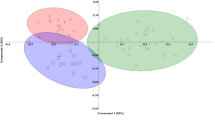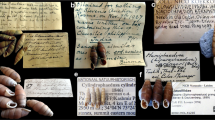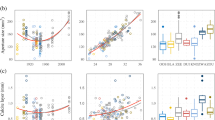Abstract
IN reviewing the characters of the dominant species of oysters, Ostrea, of which something is known of the life-history as well as the shell-characters, two distinct types are recognisable.
This is a preview of subscription content, access via your institution
Access options
Subscribe to this journal
Receive 51 print issues and online access
$199.00 per year
only $3.90 per issue
Buy this article
- Purchase on Springer Link
- Instant access to full article PDF
Prices may be subject to local taxes which are calculated during checkout
Similar content being viewed by others
References
Hoek, P. P. C., Tijd. Nederl. Dierk. Ver., Supp. Deel i., 1883–4.
Dean, B., Bull. U.S.F.C., 10; 1890 (1892).
Stafford, J., œThe Canadian Oyster, 1913, Ottawa.
Roughley, T. C., Australian Museum Magazine, 2, 1925.
Dean, B., Bull. U.S.F.C., 22 ; 1902 (1904).
Roughley, T. C., Proc. Linn. Soc. N.S.W., 2, 4; 1926.
Sowerby, G. B., in Reeve's Conchologia Iconica, Part 288, 1871.
Author information
Authors and Affiliations
Rights and permissions
About this article
Cite this article
ORTON, J. The Dominant Species of Ostrea. Nature 121, 320–321 (1928). https://doi.org/10.1038/121320b0
Issue Date:
DOI: https://doi.org/10.1038/121320b0
This article is cited by
-
Seasonal gonadal changes in the adult backwater oyster,Ostrea (Crassostrea) Madrasensis preston from ennur near madras
Proceedings / Indian Academy of Sciences (1956)
Comments
By submitting a comment you agree to abide by our Terms and Community Guidelines. If you find something abusive or that does not comply with our terms or guidelines please flag it as inappropriate.



